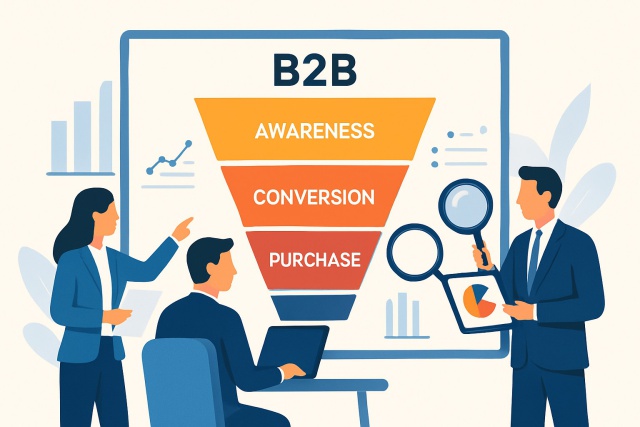Why Is Content Marketing Important to Build Brand Trust?


Content marketing is all about creating and sharing relevant and engaging material that grabs the attention of a clearly defined audience and keeps them coming back for more. This is exactly why content marketing is important—it builds brand trust, which is the confidence consumers place in a brand's reliability and integrity and its knack for delivering on promises—no empty words here.
How Content Marketing Quietly Works Its Magic to Build Brand Credibility
Carefully crafted content sends a clear message to customers that this brand really knows its stuff and can be trusted. By sharing expert blog posts and in-depth guides with well-thought-out educational materials, companies position themselves as go-to leaders in their field.
- Regularly sharing educational content isn’t just a checkbox. It helps a brand come across as a trustworthy source of information people can count on.
- Bringing in expert interviews or guest contributors adds fresh credibility and offers knowledgeable perspectives that keep things interesting.
- Leaning on data-supported articles shows a clear commitment to transparency and accuracy that really resonates with audiences.
- Offering exclusive industry insights doesn’t just keep people in the loop. It often puts them a step ahead of the curve, which is always a nice bonus.
- Open brand storytelling that shares both challenges and wins makes the business feel more human and relatable. This builds trust that lasts for the long haul.
Improving Customer Engagement with Content A Fresh Take
Engaging and relevant content really gets customers talking and sharing their thoughts. It also encourages them to jump into ongoing conversations. This steady back-and-forth doesn’t just keep the ball rolling. It builds stronger relationships, makes customers feel genuinely appreciated, and quietly works behind the scenes to boost brand trust.
Zero in on what really matters to your customers and tackle their main concerns head-on so the whole experience feels genuinely personal.
Mix things up with interactive formats like quizzes and webinars. Polls also boost engagement and keep people coming back.
Respond swiftly and thoughtfully to customer comments and questions because it shows you care about what they have to say.
Build brand communities where customers can gather and share stories. It’s like creating a home away from home for your fans.
Encourage user-generated content to spark authentic support and excitement around your brand. Nothing beats a genuine shoutout from a happy customer.
Creating Lasting Relationships Through Genuine Connection That Truly Resonates
Genuine storytelling and open content that truly reflect a brand's core values go a long way in making a company feel more relatable.
"Brands that truly lean into authentic content marketing tend to see noticeable bumps in consumer trust and often enjoy repeat engagement—both of which usually translate into stronger loyalty," says marketing expert Lisa Reardon, who’s seen it play out time and again.
Showing Your Value and Expertise Consistently (Because Letting People Know What You Bring to the Table Never Gets Old)
Regularly sharing useful content does wonders for building brand recognition and sets the company up as a go-to resource people can actually count on.
- Keeping a steady publishing schedule makes it easier for your audience to know when to expect fresh content and builds a sense of reliability that keeps them coming back.
- Spreading your content across multiple channels broadens your reach and boosts your brand’s visibility.
- Maintaining a consistent quality bar helps build and hold onto the trust people place in your brand’s know-how.
- Creating content series lets you dig into topics and hold readers’ attention longer while creating an ongoing conversation.
- Getting regular input from experts cranks up your credibility and keeps your content grounded in authority.
Why Is Content Marketing Important? How It Plays a Big Role in Building Trust
Marketers often keep a close eye on key metrics like engagement rates and repeat visits to piece together a clearer picture of how content marketing builds trust and mirrors consumer confidence.
| Metric | Description | How it Reflects Trust | Example / Benchmark Values |
|---|---|---|---|
| Engagement Rate | Tracks likes, shares, and comments on content | A higher rate usually signals the audience is genuinely interested and tends to trust what they see | Typically 3-5% on blogs, often pushing even higher on social media platforms |
| Repeat Visits | How often visitors come back to the site | Shows customer loyalty and overall satisfaction—basically a good sign you’re doing something right | Trusted brands often enjoy 20-40% repeat visitors |
| Customer Feedback | Surveys and reviews that capture opinions | Positive feedback generally reflects a stronger bond of trust with the brand—people tend to speak when they care | Average ratings of 4 stars or more |
| Brand Sentiment | Evaluates public perception and tone | A positive sentiment score suggests the brand is seen in a favorable light and earns genuine trust | Net Sentiment Scores over 70% |
| Time on Page | Average time visitors spend engaging with content | Longer visits usually mean the content is respected, credible, and worth sticking around for | Usually 3-5 minutes per article on average |
Addressing Doubts Through Real-World Case Studies That Speak Volumes
Several brands have really shown how powerful content marketing can be for building trust. For example, a SaaS company rolled out detailed tutorials and authentic customer success stories. User retention jumped by a solid 25%. On the flip side, a retail brand got creative with heartfelt behind-the-scenes videos and straightforward shipping updates. This clearly boosted their customer satisfaction scores.
- Company A: A financial services firm rolled out in-depth analysis reports that set it apart as a market leader and sparked a 40% jump in client inquiries—proof that solid info still wins.
- Company B: An e-commerce brand got creative with detailed product demo videos and heartfelt customer testimonials. This built genuine trust and nudged repeat purchases up 30%.
- Company C: A tech startup shared blog posts about their development hurdles. This fostered a close-knit community and paved the way for a successful crowdfunding campaign—a classic case of honesty paying off.
- Company D: A health supplement brand went the extra mile with thoroughly researched articles vetted by experts. This boosted their credibility and doubled their subscriber base, which is no small feat.

Illustration showing various content marketing formats that build brand trust across multiple platforms.
Practical Tips for Building Stronger Brand Trust Through Content Marketing
Building trust is not just a checkbox exercise—it's the secret sauce for any brand that wants to stick around and actually mean something to people. So, let’s roll up our sleeves and dive into some down-to-earth tips to help your content hit the right notes and build that solid, go-to kind of trust that keeps customers coming back.
This is why content marketing is important: building brand trust shines when you offer genuine value and keep things transparent. Craft engaging experiences that put your customers front and center.
Really get to know your audience’s needs and preferences inside and out so you can craft content that hits home and doesn’t just float by unnoticed.
Make it a point to focus on education and value rather than heavy-handed promotion because earning credibility this way plants seeds for a long-lasting relationship.
Don’t be shy about sharing your brand’s mission and challenges and behind-the-scenes processes. People appreciate that raw authenticity and it goes a long way.
Actively encourage community engagement through comments, social media groups and campaigns that spotlight user-generated content because it’s that kind of interaction that turns casual viewers into loyal fans.
Keep a close eye on engagement metrics and customer feedback regularly. Tweaking your content strategy based on what really resonates will bring out the best results without a doubt.
Frequently Asked Questions
How long does it take for content marketing to build brand trust?
Building trust through content marketing usually takes about 6 to 12 months of consistent high-quality content. Early signs like comments or shares can appear within a few weeks and give you a sneak peek of progress. The key is to keep going. Regularly delivering real value strengthens credibility over the long haul even if it feels like a slow process at times.
Can small businesses use content marketing to compete with larger brands?
Absolutely. Small businesses often excel in content marketing by focusing on niche expertise, genuine storytelling and personal engagement—areas where big brands sometimes fall short. Create content that truly connects with your audience. That is how trust grows and you carve out your own space even when larger competitors are around.
What types of content are most effective for establishing trust?
Educational guides, solid data-backed articles, transparent case studies and expert interviews usually hit the mark. Interactive formats like webinars and user-generated content such as reviews and testimonials also work wonders. They show real community involvement and authentic validation—nothing builds trust like hearing it straight from the source.
How do I measure if my content is actually building trust?
Watch metrics like repeat visits to your site, time spent on pages, social shares and positive comments or survey feedback. When you notice strong engagement with educational content and increased customer retention, it’s a good sign that your trust is growing.
Is it better to focus on quantity or quality when publishing content for trust-building?
Quality definitely matters most here. One well-researched actionable piece a month will outperform rushed daily posts that only fill space. Consistency matters but depth, accuracy and relevance should always come first. Your audience tends to reward thoughtful content with lasting trust.
How can I make my brand’s content feel more authentic?
Give people a look behind the scenes. Share the ups and downs honestly and include real voices from employees or customers. Avoid overly polished sales pitches. Those small imperfections and honest moments humanize your brand and make trust feel earned not given.




